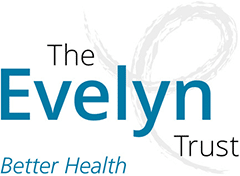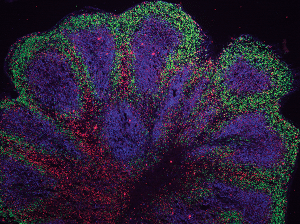Little is known about how the disease is caused, or how it starts in the brain and spinal cord. In striving to shed light on this, researcher Dr Andras Lakatos and his team at the Department of Clinical Neurosciences have had significant success with ‘mini brains’ grown in the lab to track the progress of amyotrophic lateral sclerosis (ALS), one of the forms of motor neurone disease that often overlaps with dementia. This work has been part-funded by The Evelyn Trust.
“Kornélia Szebényi, a postdoctoral researcher in my lab, has used stem cells deriving from skin cells of patients, to grow pea-sized organoids, or ‘mini brains’, so we can observe early changes in different cell populations,” explains Andras.
Although this is not the first time these organoids have been used to study brain disease, Andras and his team have been successful in growing them for more than 240 days – a much longer timeframe than in previous research. This is incredibly useful as it has allowed them to track the development of the disease over time. The team hopes that these organoids will also prove revolutionary for the testing of drug treatments.
“As we have grown these organoids for longer we have been able to see problems arising in various cell types, indicating more precise targets for drugs. We’re hopeful that our work will help us to recognise the very early signs of the disease in patients so that ultimately treatments could be used to arrest its development. We’re currently extending this work with collaborators: Gabi Balmus from the UK Dementia Research Institute and Susanna Mierau and Ole Paulsen from the Department of Physiology, Development and Neuroscience at the University of Cambridge whose work in this area is also funded by The Evelyn Trust.”
You can read more about the ground-breaking work of Dr Lakatos and his lab on the Cambridge Neuroscience website.

